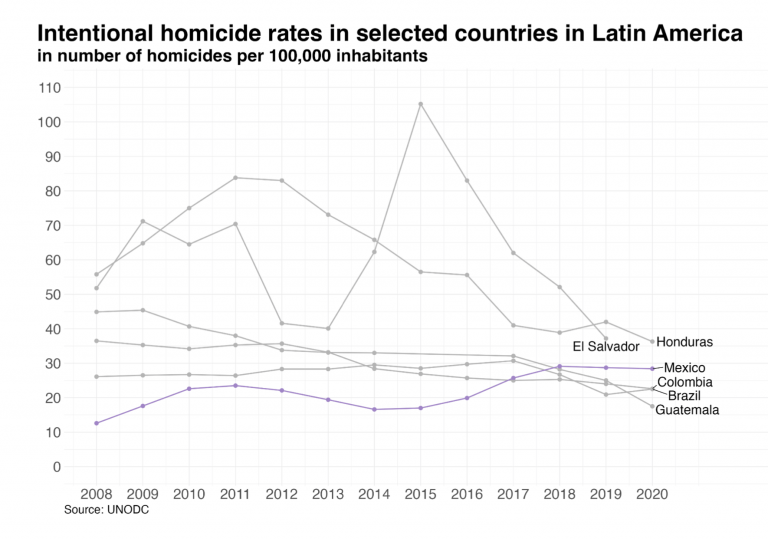www.aljazeerah.info
Opinion Editorials, March 2023
Archives
Mission & Name
Conflict Terminology
Editorials
Gaza Holocaust
Gulf War
Isdood
Islam
News
News Photos
Opinion Editorials
US Foreign Policy (Dr. El-Najjar's Articles)
www.aljazeerah.info
Solutions for Mexico's Violence and Impunity Cycle Need to Strengthen the Capabilities of Civilian Institutions By Monserrat Lopez Perez Mexico Today, March 9, 2023 |
 |
|
|
Intentional homicide rates in selected Latin American countries
2008-2020 Impunidad Cero Mexico today |
Mexico’s Violence and Impunity Cycle
Mexico is trapped in a vicious cycle of violence and impunity. In 2022, 85 people were murdered, and ten women were intentionally killed every single day. Despite the gravity of such crimes, Mexican authorities are failing to prosecute and investigate them diligently and with a gender perspective.
In our most recent report (“Impunity in Intentional Homicides and Femicides”) we at Impunidad Cero use data to highlight Mexico’s justice crisis and offer public policy recommendations to break the never-ending cycle of violence and impunity in which the country is trapped.
Violence Levels in Mexico
Violence is the norm in Mexico. In 2018, Mexico reached the highest intentional homicide rate in recent history, with 29 murders per 100,000 inhabitants. Although homicide rates have decreased 7.8 percent since 2018, Mexico remains a country with high levels of homicides. In 2020, Mexico’s murder rate was 28.4 per 100,000, higher than Colombia, Brazil, and Guatemala, all countries which have historically recorded higher rates.
Although the majority of victims of intentional killings in Mexico are men, murder rates should be analyzed through a gender lens. Gender violence is a widespread problem in Mexican society, with seven out of every 10 women, having experienced it in some form. Research has shown how microaggressions by partners or family members can lead to more extreme aggression, including femicide —the violent murder of women based on their gender.
While Mexican law recognizes femicide as a crime since 2011, authorities continue to fail to investigate the violent killings of women from a gender perspective. Despite the Mexican Supreme Court stating that all violent murders of women should be investigated as femicide, only 27 percent of violent murders of women were investigated and prosecuted as such in 2021 according estimates using data from Mexico’s Executive Secretariat of National Public Security (SESNSP). Furthermore, murders of women tend to be classified as non-intentional murders at a higher degree than killings of men. For instance, only 35 percent of all murders of men are classified as manslaughter, while more than half (58 percent) of murders of women are classified as such.
Mexico’s Impunity Levels
In order to figure out Mexico’s impunity levels, we estimated the proportion of intentional homicides and femicides that have not led to convictions over six years. Using this estimate, we found that only 7 out of every 100 intentional homicides committed in the last six years have led to convictions, and more than half of femicides recorded during the same time frame remain unsolved.
The lack of institutional capacities to take action against such serious offenses and the prevalence of organized crime in Mexico both perpetuate the lack of justice. One big challenge is that State Attorneys General are responsible for prosecuting intentional killings. However, around 70 percent of murders in 2021 were committed with firearms, implying that they are related to crimes such as illegal weapon carrying or organized crime, which fall under Federal jurisdiction. This emphasizes the importance of institutional coordination between the State and Federal levels, particularly in Mexican states with a significant prevalence of organized crime-related homicides, such as Baja California, Guanajuato, Zacatecas, and Jalisco.
How to Reduce Violence and Impunity Levels?
At Impunidad Cero we developed a series of public policy recommendations to reduce gender violence and improve prosecution of intentional murders and femicides in Mexico. Among them are: first, to focus on gender violence prevention by providing public assistance to women and their children in situations of violence. Shelter services and protection orders can help to safeguard women and prevent violence from escalating.
Second, it is imperative that State Attorneys General improve their investigative capacities given their deficiencies in the prosecution of high-impact crimes. For instance, State Attorneys General could focus their resources in developing and applying information and communication technologies (ICT), along with creating or updating gender-based protocols. Also, it is crucial to improve coordination among actors in the Mexican criminal system involved in the investigation process, especially between Federal and state agencies, public prosecutors and police officers. Police officers are normally the first to arrive at crime scenes, have a proximity relationship with citizens, and can provide helpful information for the prosecution process.
Last but not least, Mexico needs a National Security and Justice Strategy centered on civil institutions, which are responsible for prosecuting homicides, femicides, and more than 90 percent of the crimes. However, the current Federal government has centered its security strategy on strengthening military forces by providing them with more resources and additional functions beyond preserving national security. Meanwhile, state persecutors continue to operate with few personnel and funds which results in a lack of institutional capacity to investigate crimes.
The deployment of more armed troops will not bring justice to unsolved crimes in Mexico. The bet on putting more military forces on the streets has weakened Mexican federalism along with state and local security institutions. To break the cycle of violence and impunity, Mexico needs to strengthen the capabilities of civilian institutions to prevent and prosecute violent crime.
* Monserrat López Pérez is data analyst at Impunidad Cero, a civil society organization focused in measuring and highlighting impunity in the Mexican criminal system. Twitter: @ImpunidadCeroMx
***
|
|
|
|
||
|
||||||


